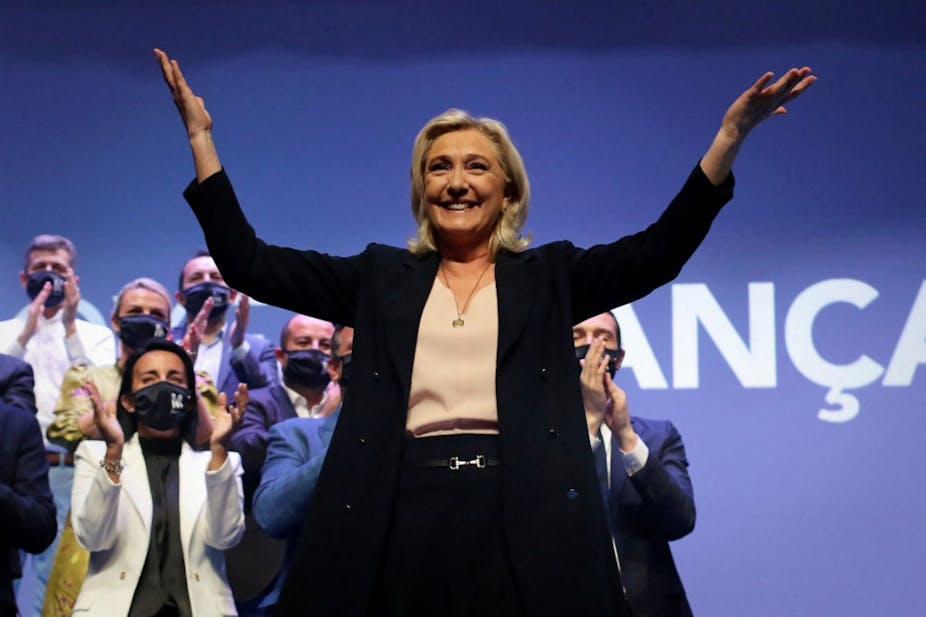As the economic impact of the war in Ukraine looms over French voters, Marine Le Pen’s social-populist appeal may give her a boost in the battle over second place that is taking place to the right of France’s presidential politics, despite her prominently pro-Russian stance prior to the invasion.
Economic concerns take over the presidential agenda
The economic consequences of the war in Ukraine are already being felt in France. The surge in energy prices is adding to the inflation that has accompanied the post-Covid‑19 recovery of France’s economy. Price shocks are expected to have a significant impact on both households and companies.
Economic fears are clearly one of the dominant themes of the campaign. According to CEVIPOF-Science Po Paris’ latest presidential election survey, 58% of those polled stated that prices and purchasing power will bear an important influence on their vote in April, up by 6% since early March.
While the war in Ukraine is of great concern in France, fears are falling somewhat. A third (34%) of respondents say they’re “very worried” about the war: it was 43% early March. The war is also becoming less salient politically: only 23% of our respondents say it will matter to their vote, down by 10% from two weeks earlier.
The focus now is on the economic consequences of the Ukraine crisis, with 43% of respondents claiming they are “very worried”. Fears of a wider conflict or a nuclear strike by Russia are, on the other hand, shrinking at 33% and 28%, down by 6% and 7% respectively since early March (see Figure 1).
Figure 1. Changing concerns about the war in Ukraine
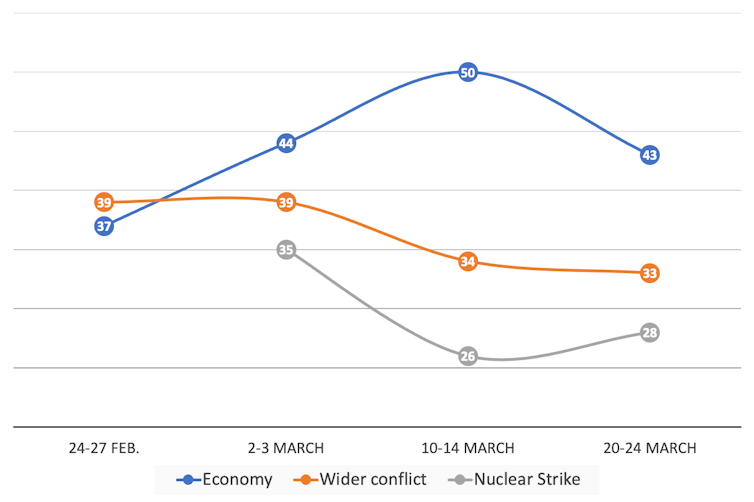
The outcome of the presidential race in April will hinge a good deal on the candidates’ response to bread-and-butter issues in the electorate.
Anticipating a “long crisis”, Jean Castex’s government has signalled the importance of supporting the French economy by drawing up an emergency “resilience plan”. The 26-billion-euros-strong plan is intended to help companies and households cope with rising energy costs.
The plan is intended to help keep Macron’s re-election bid on track just three weeks ahead of the first-round vote. Memories of 2018’s “yellow jackets” movement are still vivid, and they have prompted the government to respond quickly to signs of popular discontent.
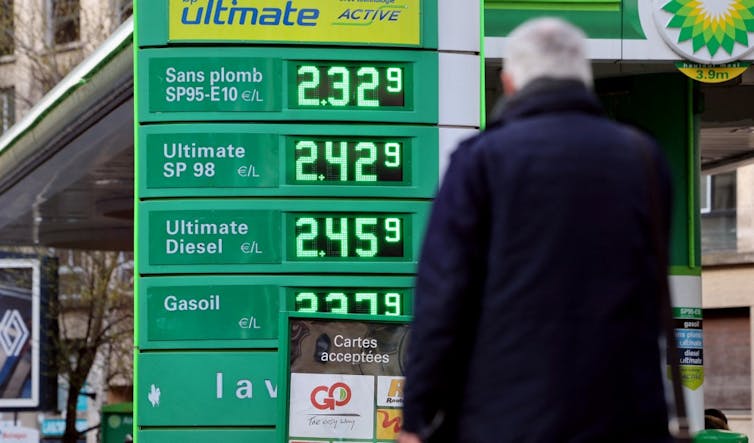
Diverging economic strategies
Macron still dominates the polls – at 28% in our latest study – but economic concerns have become key to the battle over second place.
To the left of the political spectrum, Jean-Luc Mélenchon from La France Insoumise (FI) is consolidating his lead in a crowded field, currently polling at 14% in our survey. His agenda of social justice and economic redistribution is popular among voters who see the Insoumis as a vote utile (tactical vote) for the left to make it to the second round. Mélenchon has moved ahead despite his pro-Russian stance prior to the invasion and subsequent attempts to recalibrate earlier comments.
Sinking in the polls after creating an early buzz among potential voters, Éric Zemmour has continued to push his overriding theme of immigration. On March 22, he stated that if elected, he would create a government ministry of “reimmigration” with the goal of forcing 1 million French residents to leave the country.
Le Pen has also run into trouble with her longstanding pro-Russian positions and support for Vladimir Putin, although these seem to have only marginally hurt her standing among potential voters.
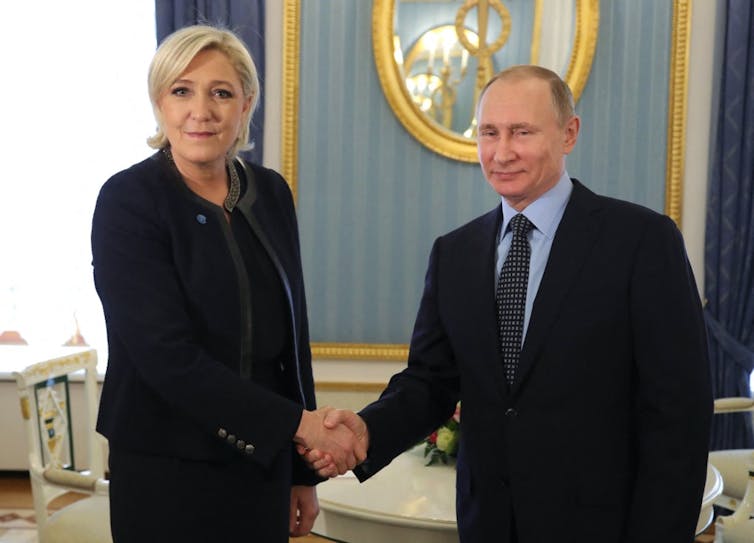
A potentially more important consideration relates to the candidates’ economic stances. We see diverging economic strategies to the right of French politics, which may produce different opportunities in the first round.
When it comes to the government’s coffers, Zemmour and Valérie Pécresse of Les Republicains (LR) are pushing a right-wing agenda of tax cuts and welfare retrenchment, including unpopular pension reform. Amid turbulent economic times, such conservatism appears increasingly at odds with popular demand for more protection and state intervention, most evidently among working-class and lower-middle-class voters.
Le Pen has chosen a different economic path, emphasising social issues, healthcare, public services and redistribution.
Even prior to Russia’s invasion of Ukraine, the Rassemblement National (RN) candidate had promised a positive “shock” to purchasing power, pledging that she would “protect the people” and “give the French their money back”. Alongside traditional immigration and security themes – far less present than with Zemmour, however – Le Pen’s presidential platform offers a significant Keynesian package of lower VAT, higher wages, tax exemptions and free transport for young workers, while advocating the revaluation of pensions.
Le Pen’s social-populist credentials
According to a statistical analysis of Le Pen’s presidential manifesto, left-leaning policies make up no less than two-thirds (66%) of her economic platform: this is the highest percentage since the party’s electoral breakthrough in the mid-1980s (see Figure 2).
In contrast, the RN has moved further away from the hallmarks of conservative economics such as welfare retrenchment, small government and free market reforms. Such policies make up only 21% of the 2022 manifesto compared with 35% five years ago. It was nearly 80% under Jean-Marie Le Pen back in the mid-1980s.
Figure 2. Clusters of FN/RN economic policies since 1986
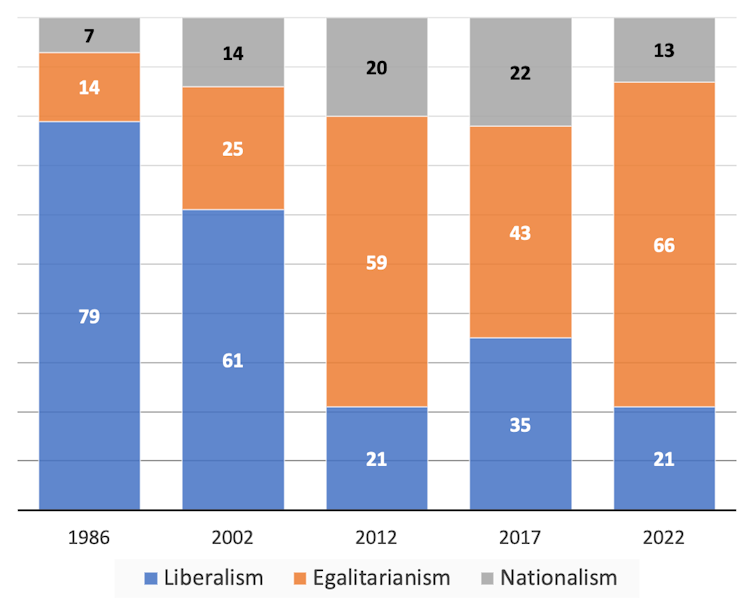
In line with the RN’s traditional nationalist and populist agenda of opposing the so-called “globalist” elite to the “people”, Le Pen’s increasingly social tone bears all of the trappings of social populism – a political approach drawing from both left-leaning egalitarian and nationalist economic traditions.
This shift is nothing new to RN politics, however. Le Pen has worked to establish a reputation as the candidate of the pouvoir d’achat (purchasing power) for more than a decade, immediately after she took over her father’s party and veered to the economic left. In the wake of the 2008 financial and 2011 Eurozone debt crises, the FN had taken up a “Keynesian” program of state regulation, government spending, and public services expansion, emphasising income redistribution and purchasing power. In 2012, 59% of the FN’s economic proposals were already leaning toward the economic left.
Le Pen’s successful gamble?
Since 2017, Le Pen has worked to cultivate her social-populist image, joining ranks with the left and trade unions against Macron on several occasions. In late 2019, she opposed the government’s pension reform. In March 2021, she denounced cuts to the unemployment insurance scheme as “shameful, economically stupid, humanly unworthy and deeply unfair”.
As the latest CEVIPOF National Election survey suggests, the RN candidate is currently polling at 17.5% (up by 3% since early March) compared to 11.5% and 10% for Zemmour and Pécresse, respectively.
In a recent campaign meeting, Le Pen reiterated her populist vision, contrasting the “little” people to the “big” interests. “Between Emmanuel Macron and us,” Le Pen said, “it is a choice between the power of money for the few and more purchasing power for all”.
Le Pen’s social-populist agenda clearly resonates with a slice of the French electorate, particularly working-class and less-educated voters. Rising fuel prices tied to Russia’s invasion have been easily incorporated in Le Pen’s social-populist rhetoric, with the RN leader pledging that she would lower petrol taxes and compensate by taxing major oil companies. More recently she said that she would enact a zero-VAT policy on a selection of 100 essential products to reduce prices for low-income households.
The CEVIPOF survey shows that war-driven economic concerns are highest among Marine Le Pen’s electoral support: 53% say they are “very worried” about the economy, as opposed to 43% in the general electorate. 69% of Le Pen’s voters say that concerns about purchasing power will define their first-round vote, as opposed to 56% and 47% among those who say they would vote for Valérie Pécresse and Éric Zemmour.
By pushing a social-populist agenda long before the war and increasing her rhetoric after the invasion, Le Pen is gambling that growing socio-economic concerns among the country’s electorate could help give her an edge among voters. So far, polls appear to be proving her right.


